Excerpts from The Indianapolis Journal, 1897-
“CASTE SYSTEM IN INDIA”
“DOES NOT DIFFER GREATLY FROM THE CLASS SYSTEM OF EUROPE”
“Organization of Indian Society Complicates the Application of Relief to Famine Sufferers”
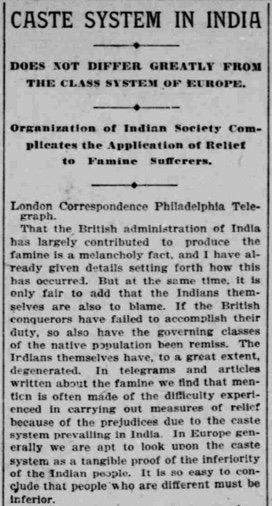
That the British administration of India has largely contributed to produce the famine is a melancholy fact, and I have already given details setting forth how this has occurred. But at the same time, it is only fair to add that the Indians themselves are to blame.
If the British conquerors have failed to accomplish their duty, so also have the governing classes of the native population been remiss. The Indians themselves have, to a great extent, degenerated.
In telegrams and articles written about the famine we find that mention is often made of the difficulty experienced in carrying out measures of relief because of the prejudices due to the caste system prevailing in India.
In Europe generally we are apt to look upon the caste system as a tangible proof of the inferiority of the Indian people. It is so easy to conclude that people who are different must be inferior.
Yet if the truth were only known, how absurd it would seem for the European or American to cast stones at the Hindoo because of his caste system, when after all our own race has been developed under almost identically the same system.
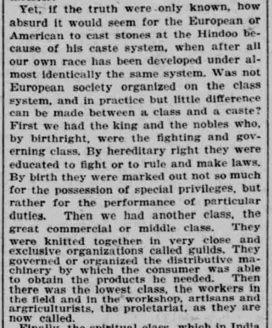
Was not European society organized on the class system, and in practice but little difference can be mad between a class and a caste? First we had the king and the nobles who, by birthright, were the fighting and governing class by hereditary right they were educated to fight or to rule and make laws. By birth they were marked out not so much for the possession of special privileges, but rather for the performance of particular duties.
Then we had another class, the great commercial or middle class. They were knitted together in very close and exclusive organizations called guilds. They governed or organized the distributive machinery by which the consumer was able to obtain the products he needed.
Then there was the lowest class, the workers in the field and in the workshop, artisans and agriculturalists, the proletariat, as they are now called.
Finally, the spiritual class, which in India is the fist caste, was not so clearly defined in Europe because religion was not so closely associated with everyday life. Still we have had the clergy which for many centuries were well nigh the only reachers or learned men that existed. Now these class distinctions have been broken down; the classes forget their respective duties, commingle; and it cannot be said that his confusion has been an unmixed advantage.
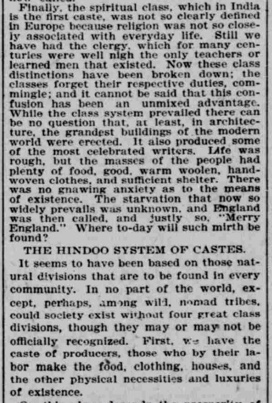
While the class system prevailed there can be no question that, at least, in architecture, the grandest buildings of the modern world were erected. It also produced some of the most celebrated writers. There was no gnawing anxiety as to the means of existence. The starvation that now so widely prevails was unknown, and England was then called, and justly so ‘Merry England’.
It seems to have been based on those natural division that are to be found in every community. In no part of the world, except, perhaps, among the wild, nomad tribes, could society exist without four great class divisions, though they may or may not be officially recognized.
First, we have the caste of producers, those who by their labor make the food, clothing, houses, and the other physical necessities and luxuries of existence.
After the producing caste we have the distributing caste. Its mission is to collect from the producers all they produce and distribute it over the nation and send it where it is most needed. Then comes the caste of the guardians of the nation.
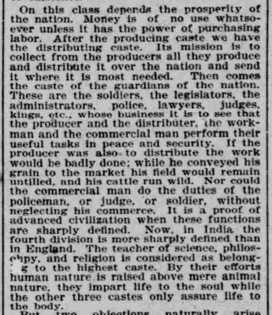
They are the soldiers, the legislators, the administrators, police, lawyers, judges, kings etc. whose business it is to see that the producer and the distributor, the workman and the commercial man perform their useful tasks in peace and security.
Now, in India the fourth division is more sharply defined than in England. The teacher of science, philosophy, and religion is considered as belonging to the highest caste. By their efforts human nature is raised about mere animal nature.
They impart life to the soul while the other three castes only assure life to the body. But two objections naturally arise against this system of dividing society into castes. First, who shall decide, and decide with justice, to what class each person shall belong.
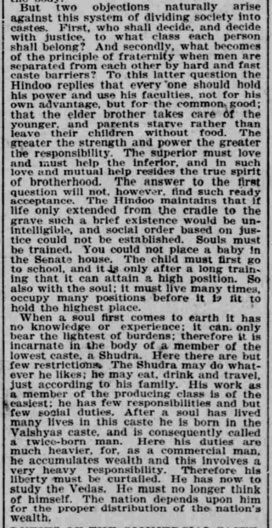
And secondly, what becomes of the principle of fraternity when men are separated from each other by hard and fast caste barriers?
To this latter question the Hindoo replies that every one should hold his power and use his faculties, not for his own advantage but for the common good; that the elder brother takes care of the younger, and parents starve rather than leave their children without food.
The greater the strength and power the greater the responsibility. The superior must love and must help the inferior, and in such love and mutual help resides the true spirit of brotherhood. The answer to the first question will not, however, find such ready acceptance.
The Hindoo maintains that if life only extended from the cradle to the grave such a brief existence would be unintelligible, and social order based on justice could not be stablished. Souls must be trained. You could not place a baby in the Senate house. The child must first go to school, and it is only after a long training that it can attain a high position. So also with the soul: it must live many times, occupy many positions before it is fit to hold the highest place.
Corruption of the Indian Caste
Such in its origin was the caste system, and it must be acknowledged that it is any ideal system which has failed only because it was too good to be realized by such imperfect creatures as human beings.
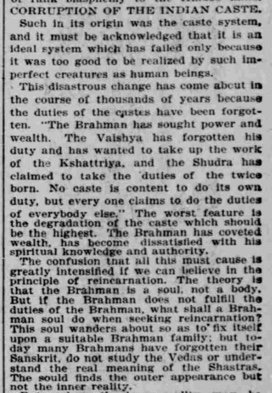
This disastrous change has come about in the course of thousands of years because the duties of the castes have been forgotten… The worst feature is the degradation of the caste which should be the highest.
The Brahmin has coveted wealth, has become dissatisfied with his spiritual knowledge and authority. The confusion that all this must cause is greatly intensified if we can believe in the principle of reincarnation.
But perhaps the inner reality may be found in some other caste, and the Brahman soul prefers the outer degradation of the body rather than the degradation of the spiritual.
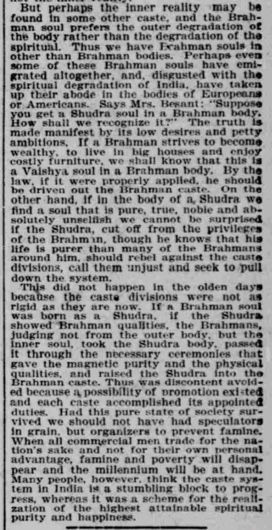
Thus we have Brahman souls in other than Brahman bodies. Perhaps even some of these Brahman souls have emigrated altogether, and, disgusted with the spiritual degradation of India, have taken up their abode in the bodies of Europeans or Americans.
Says Mrs. Besant: ‘Suppose you get. Shudra soul in a Brahman body. How shall we recognize it?’ The truth is made manifest by it slow desires and petty ambitions.
If a Brahman strives to become wealthy, to live in big houses and enjoy costly furniture, we shall know this is. Vaishya soul in a Brahman body. By the law, if it were properly applied, he should be driven out the Brahman caste.
On the other hand, if in the body of a Shudra we find a soul that is pure, true, noble and absolutely unselfish we cannot be surprised if the Shudra, cut off from the privileges of the Brahman, though he knows that his life is purer than many of the Brahmans around him should rebel against the caste divisions, call them unjust and seek to pull down the system. This did not happen in the olden days because the caste divisions were not as rigid as they are now…
If the Shudra showed Brahman qualities, the Brahmins, judging not from the outer body, but the inner soul, took the Shudra body, passed it through the necessary ceremonies that gave the magnetic purity and the physical qualities, and raised the Shudra into the Brahman caste.
Thus was discontent avoided because a possibility of promotion existed and each caste accomplished its appointed duties. Had this pure state of society survived we should not have had speculators in grain, but organizers to prevent famine.
When all commercial men trade for the nation’s advantage, famine and poverty will disappear and the millennium will be at hand.
Many people, however, think the caste system in India is a stumbling block to progress, whereas it was a scheme for the realization of the highest attainable spiritual purity and happiness.
(This article has compiled from the tweet thread of @HindooHistory)

